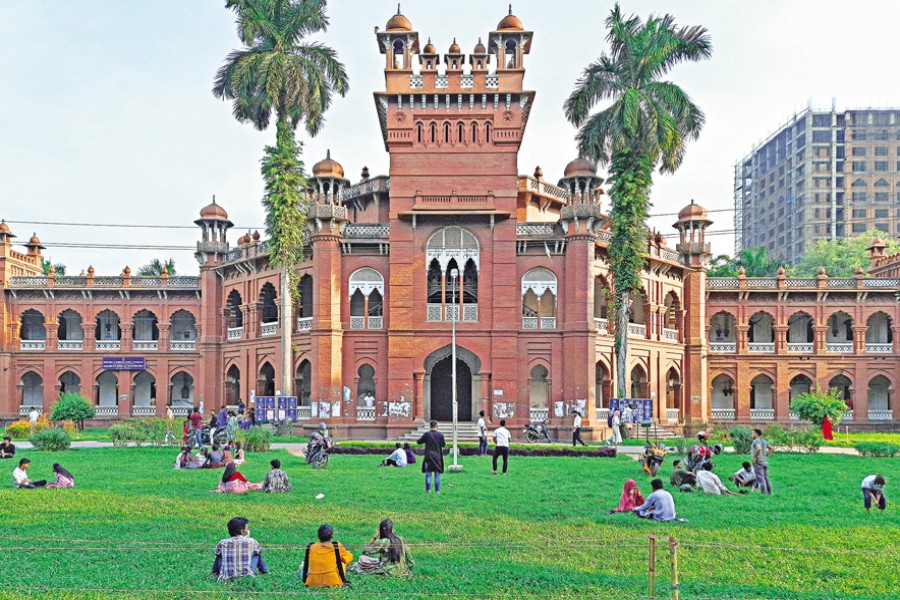
Published :
Updated :

Bangladesh stands at a pivotal moment in its history, where fostering a research mindset amongst students proves essential for long-term progress. Despite being driven by a young population, the development of a robust research culture remains hampered by institutional issues, including rigid curricula, limited research opportunities, and inadequate mentorship. A 2025 survey reveals that whilst 85.1 per cent of college students are aware of mental health concerns, only 62.1 per cent possess adequate knowledge of these issues, indicating gaps in critical thinking. Moreover, during the 2024 demonstrations, 91.2 per cent of students experienced psychological distress, highlighting the need for structured research engagement to channel youthful energy effectively. By addressing these barriers through mentorship, inquiry-based education, and policy reforms, Bangladesh can cultivate innovative thinkers for the future.
The current state of research mentality in Bangladesh: The transition from traditional rote-learning methods to contemporary, inquiry-based approaches in Bangladesh's educational system faces substantial structural challenges. A 2025 study demonstrates that Inquiry-Based Learning (IBL) in Dhaka schools has significantly enhanced students' critical thinking, creativity, communication, and collaboration skills. However, these programmes remain concentrated in elite urban institutions, leaving rural students disadvantaged. The digital divide compounds this urban-rural disparity: during Covid-19 pandemic, over 70 per cent of rural students struggled with internet access, whilst their urban counterparts benefited from superior infrastructure for online education. Poor infrastructure and insufficient teacher training in digital pedagogy hinder research-driven education, despite students' preference for flexible digital learning.
The growth mindset shows potential for inspiring students, particularly females. A 2022 randomised trial in Bangladesh found that interventions teaching growth mindset increased academic aspirations, with follow-up data revealing 15 per cent higher STEM interest amongst females. However, fixed mindset cultures persist, discouraging failure and stifling creativity. OECD's 2023 PISA data supports this, showing that students with growth mindsets are 32 per cent more likely to set ambitious goals, especially in resource-constrained environments. Nevertheless, only 38 per cent of teachers are equipped to promote process-based learning, with 60 per cent of classes still prioritising natural ability over effort.
Political instability further disrupts academic progress. In 2025, frequent administrative changes and institutional closures delayed graduation dates and compromised research continuity. The CSIS 2024 report directly linked political upheaval to reduced research output and education quality, whilst a Fulbright study connected this volatility to declining institutional capacity for innovation.
The digital divide remains a significant barrier. Despite a 22.9 per cent increase in mobile internet speeds, only 44.5 per cent of Bangladeshis have internet access, with rural areas disproportionately affected. Urban schools report better IBL outcomes through digital technologies, but 58.4 per cent of rural children lack equivalent resources, limiting equitable research participation. Additionally, rigid public school curricula emphasising memorisation result in 45 per cent lower engagement in IBL tasks, as fear of failure discourages exploratory learning.
Key challenges in building a research culture: Bangladesh's research environment faces systemic issues including lack of skilled mentors, institutional support, and socioeconomic constraints. Most institutions offer limited student research opportunities compared to developed countries due to insufficient funding, mentorship, and structured research programmes. Over 60 per cent of faculty members lack familiarity with learning management systems, often missing project management and digital research skills necessary for effective guidance. Socioeconomic inequalities further restrict access, as financially disadvantaged students struggle to afford laboratories, journals, or software like MATLAB or SPSS. Public universities lack private institutions' resources, with rural students having 58.4 per cent less access to research facilities than urban counterparts. Furthermore, exam-centric assessment systems discourage deep inquiry by prioritising standardised testing over experiential learning.
Weak industry-academia links and commercialisation gaps worsen these problems. Despite rising IT investment, most academic research remains theoretical, with only four Bangladeshi medical journals indexed in Scopus. Misaligned incentives focusing on paper quantity rather than innovation, inadequate R&D funding-0.02 per cent of GDP versus India's 0.3 per cent-and lack of proper equipment mean fewer than 10 per cent of public university research projects yield patents or commercial solutions. Consequently, crucial sectors like textiles depend on external research for sustainability and automation. Strengthening these connections to align research with national priorities such as climate resilience and 5IR preparation is vital for breaking dependency cycles and promoting domestic innovation.
Strategies to cultivate a research mentality: Bangladesh's educational system can significantly enhance research capabilities by integrating IBL into curricula, as demonstrated by a 2025 Dhaka study showing increased student confidence in problem-solving and analytical skills through IBL projects. Expanding digital infrastructure remains crucial for bridging urban-rural gaps, including establishing internet hubs in underserved areas and providing free university access to research databases like IEEE Xplore and JSTOR.
Simultaneously, initiatives like the Youth Research Journal's Winter Research Programme (2025) must expand nationwide to offer student researchers competitive platforms, publishing opportunities, and mentorship. Studies in Dhaka indicate AI literacy programmes and virtual research assistants can boost productivity by 40 per cent. Training in real-time data analytics tools such as Tableau and Python proves essential, particularly for rural students benefiting from hybrid digital hubs.
Academia-industry collaborations are vital for aligning research with commercial needs. Leading companies like bKash or Brain Station 23 could fund applied research in fintech or technology, matching global trends where 80 per cent of businesses prefer actionable insights. However, systemic obstacles persist, including Bangladesh's low education investment and inadequate teacher training in digital mentoring. Policy reforms allocating 5.0 per cent of university budgets for AI technologies are needed to address these gaps. By combining technology with practical application, Bangladesh can produce a new generation of problem-solving researchers focused on sustainability.
Dr Tasnimul Islam is assistant professor at Army Institute of Business Administration, Sylhet (AIBA). drtasnim@aibasylhet.edu.bd


 For all latest news, follow The Financial Express Google News channel.
For all latest news, follow The Financial Express Google News channel.